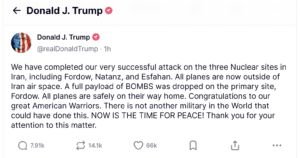India Declares It Will Never Restore Indus Waters Treaty with Pakistan
MMNN | June 22, 2025
New Delhi — In a provocative and unprecedented stance, India’s Home Minister Amit Shah has declared that New Delhi will never restore the Indus Waters Treaty with Pakistan, a decades-old accord that guarantees water access to approximately 80% of Pakistan’s agricultural sector.
Speaking to the Times of India on June 21, Shah confirmed that India has indefinitely suspended its participation in the 1960 treaty, citing a deadly terrorist attack in Indian-administered Kashmir that resulted in the deaths of 26 civilians. India has attributed the attack to Pakistan-based elements, an allegation Islamabad has consistently denied.
Shah stated unequivocally, “No, it will never be restored. We will take water that was flowing to Pakistan to Rajasthan by constructing a canal. Pakistan will be starved of water that it has been getting unjustifiably.”
This announcement has dealt a severe blow to Islamabad’s hopes of reviving negotiations around the treaty. The suspension marks a significant escalation in tensions between the two nuclear-armed nations, especially in light of their fragile ceasefire agreement reached just last month.
Last month, Reuters reported that India intends to significantly increase its utilization of river water from systems that flow downstream into Pakistan—a move viewed as part of retaliatory policy changes in response to recurring border tensions.
The Indus Waters Treaty, brokered by the World Bank in 1960, is one of the most enduring water-sharing agreements in history, designed to manage the shared use of six rivers originating in India and flowing into Pakistan. It allocates the three eastern rivers to India and the three western rivers to Pakistan, with specific provisions on usage and dispute resolution.
Pakistan’s Ministry of Foreign Affairs has yet to issue a formal response, but it has previously warned that unilateral suspension or diversion of river flows would be regarded as a violation of international law and an “act of war.” Islamabad is reportedly exploring legal avenues through international institutions, including the International Court of Justice (ICJ), to challenge India’s actions.
International observers have voiced concern over the potential for escalation, with some experts warning that the weaponization of water resources between two hostile neighbors could have severe humanitarian and geopolitical consequences.
MMNN will continue monitoring developments on this high-stakes issue affecting regional peace and food security in South Asia.
Tags: Indus Waters Treaty, India-Pakistan relations, Amit Shah, water conflict, international law, South Asia, MMNN
Transboundary Water Laws & Key Principles
1. Equitable & Reasonable Utilization
Under customary international law—and treaties like the 1997 UN Watercourses Convention—each country sharing a water system has the right to a fair share based on geography, population, and usage needs reddit.com+2reddit.com+2bhattandjoshiassociates.com+2bhattandjoshiassociates.com+2en.wikipedia.org+2policy-wire.com+2.
2. No Significant Harm Rule
States must prevent actions that significantly harm other riparian countries—either through reduced flow or water pollution en.wikipedia.org+9en.wikipedia.org+9policy-wire.com+9.
3. Obligation to Cooperate
Countries must consult, share data, and engage in good-faith negotiations before taking actions that affect shared watercourses .
4. Emergency and Armed Conflict Protections
In dangerous situations—natural disasters or war—states must notify neighbors and avoid damaging water infrastructure msuilr.org+15internationalwaterlaw.org+15en.wikipedia.org+15.
Precedents & Treaties
- Indus Waters Treaty (1960): A landmark India‑Pakistan accord emphasizing equitable sharing and harm prevention icj-cij.org+3en.wikipedia.org+3bhattandjoshiassociates.com+3.
- ICJ Cases (e.g., Gabčíkovo-Nagymaros, Pulp Mills) reinforce duties to cooperate and avoid environmental damage msuilr.org+7icj-cij.org+7icj-cij.org+7.
Does Blocking Water Amount to War?
- No Justification under current law: Unilateral interruption of shared water flow violates equitable use and no-harm rules. Even in wars, harming water supplies is illegal or severely restricted msuilr.org+8policy-wire.com+8en.wikipedia.org+8.
- Called “Act of War”? Not under UN/ICJ rules—though blockages can justify countermeasures, they don’t legally equate to war declarations.
Summary: Legal Implications
| Principle | Implication |
|---|---|
| Shared rights | Bangladesh (downstream) has legal claim to continued water access |
| Harm prohibition | Upstream state must not unduly restrict flow |
| Duty to consult | Unilateral action breaches procedural obligations |
| Armed scenario | Water infrastructure still protected under IHL and UN rules |
Conclusion: Blocking water supply to another country—even a former internal division—violates international law unless fully justified (e.g., ecological disaster or documented security threat). It does not legally constitute a declaration of war, but can justify diplomatic action, ICJ proceedings, or binding arbitration.
India says it will never restore Indus water treaty with Pakistan
The comments by India’s Home Minister Amit Shah have dimmed Islamabad’s hopes for near-term negotiations on the treaty, which guarantees water access for 80 per cent of Pakistan’s farms via three rivers originating in India.
NEW DELHI: India will never restore the Indus Waters Treaty with Islamabad, and the water flowing to Pakistan will be diverted for internal use, Home Minister Amit Shah said in an interview with local news outlet Times of India on Saturday (Jun 21).
India put into “abeyance” its participation in the 1960 treaty, which governs the usage of the Indus river system, after 26 civilians in Indian Kashmir were killed in what Delhi described as an act of terror. The treaty had guaranteed water access for 80 per cent of Pakistan’s farms through three rivers originating in India.
Pakistan has denied involvement in the incident, but the accord remains dormant despite a ceasefire agreed upon by the two nuclear-armed neighbours last month following their worst fighting in decades.
“No, it will never be restored,” Shah told the newspaper.
“We will take water that was flowing to Pakistan to Rajasthan by constructing a canal. Pakistan will be starved of water that it has been getting unjustifiably,” Shah said, referring to the north-western Indian state.
The latest comments from Shah, the most powerful cabinet minister in Prime Minister Narendra Modi’s cabinet, have dimmed Islamabad’s hopes for negotiations on the treaty in the near term.
Last month, Reuters reported that India plans to dramatically increase the water it draws from a major river that feeds Pakistani farms downstream, as part of retaliatory action.
Pakistan’s foreign ministry did not immediately respond to Reuters’ request for comments.
But it has said in the past that the treaty has no provision for one side to unilaterally pull back, and that any blocking of river water flowing to Pakistan will be considered “an act of war”.
Islamabad is also exploring a legal challenge to India’s decision to hold the treaty in abeyance under international law.






